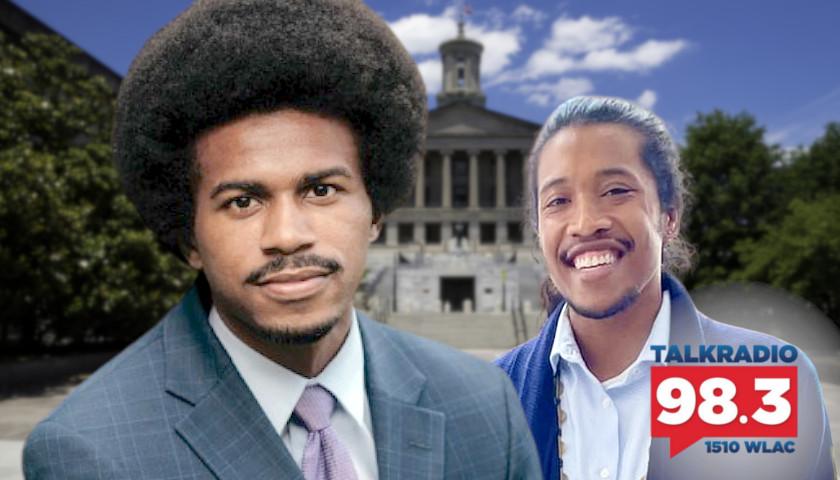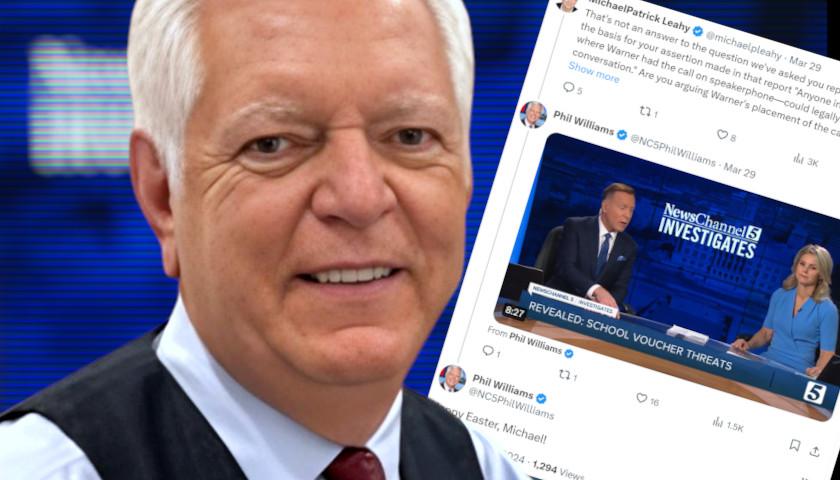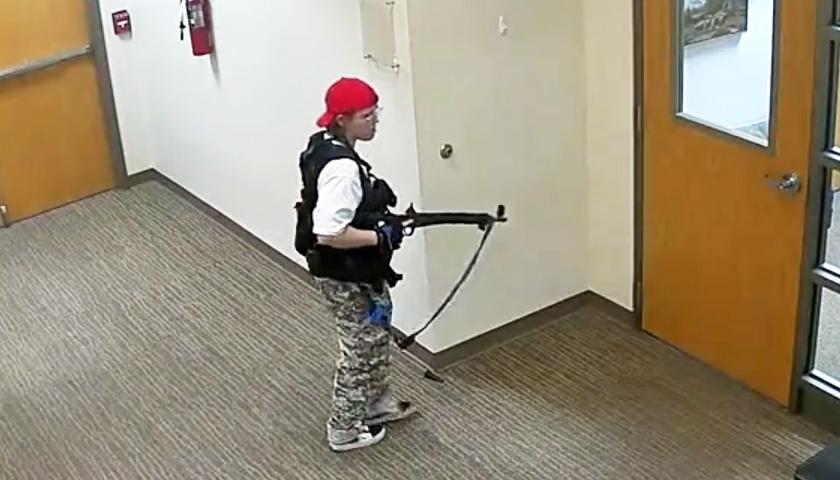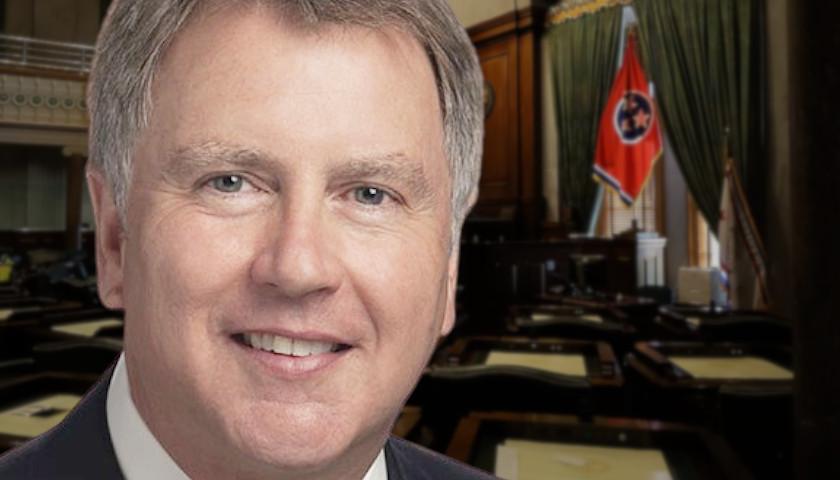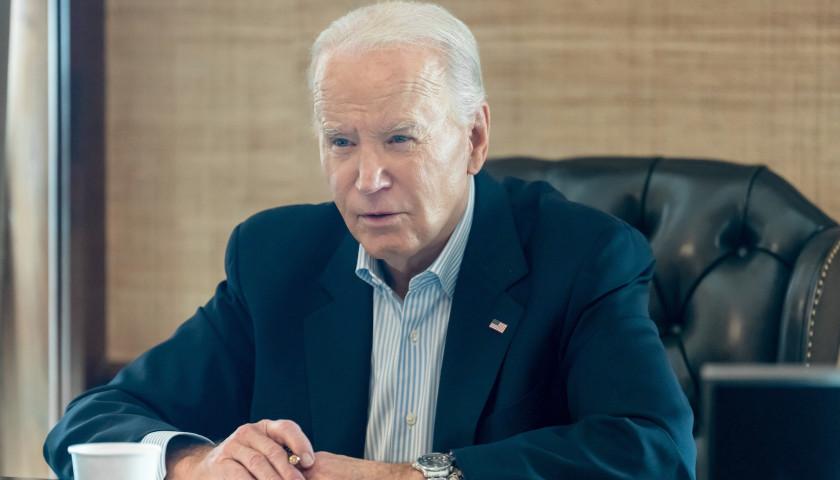Live from Music Row Thursday morning on The Tennessee Star Report with Michael Patrick Leahy – broadcast on Nashville’s Talk Radio 98.3 and 1510 WLAC weekdays from 5:00 a.m. to 8:00 a.m. – host Leahy welcomed recovering journalist Clint Brewer in studio to examine what would happen next in fulfilling the vacancies of Justin Jones and Justin Pearson.
Leahy: We are in studio with our very good friend, all-star panelist, Clint Brewer. Clint, the performative theater of the expulsion and then the receding of the interim successors to themselves, Justin Jones and Justin Pearson.
That little play is going to have its fourth act today. Justin Jones was readmitted and reseated in the House on Monday night after Eric Holder threatened to sue the state of Tennessee and Cam Sexton caved, even though he’s got a very good, strong argument that Justin Jones is not eligible to succeed himself.
Brewer: And Eric Holder, just to be clear for me, is acting as a private attorney in this matter representing Justin Jones.
Leahy: Representing Justin Jones.
Brewer: Covington, former U,S, attorney.
Leahy: Yes. Lawfare. Basically the pal of Joe Biden and Barack Obama, and Susan Rice. And so this is clearly an early warning indicator that the Department of Justice wants to jump in and air Holder’s going to sue the state of Tennessee because they are a bunch of racists is what they’re going to argue because they threw this kid out.
So that’s going on right now. The last act, Justin Pearson was renamed by the Memphis Shelby County this morning. He’s likely to be sworn back in again, another cave. But you’ve got to cave a second time because you’re not being consistent. Back to the filling of vacancies. What happens next?
Here’s what the Tennessee State Constitution says.
When 12 months or more remained prior to the next general election for legislators, a successor shall be elected by the qualified voters of the district represented and such successor shall serve the remainder of the original term. The election shall be held within such time as provided by law. The legislative body of the replaced legislator’s county of residence at the time of his election may elect an interim successor to serve until the election. Clearly, the special election shall be held within such time as provided by law.
I happen to have the law in front of me. Would you like to hear it?
Brewer: Absolutely, Mike. I’m enthralled.
Leahy: Section 2-14-102 of the Tennessee Code annotated. Special elections shall be held not less than 75 days nor more than 80 days after the officer or body charged with calling the election receives notice of the facts requiring the call. An election for an office shall be held on the same day in every county in which it’s held. That’s for a special election for the House.
Brewer: They don’t just serve out the remainder of the terms that were already there?
Leahy: No, they are interim successors.
Brewer: Because this happened early in their terms.
Leahy: More than 12 months before the end of their terms. Now, this is interesting. Special elections shall be held not less than 75 days nor more than 80 days after the officer or body charged with calling the election. That would be the governor or Secretary of State? Who’s the officer in charge of calling the election?
Brewer: I think that would probably be the Davidson County Election Commissioner, would it not?
Leahy: No, I think it might be the House, don’t you think? After the officer or body charged with calling the election received notice of the facts requiring the call.
Brewer: The whole world knows the facts. Nobody needs to receive them. I’m pretty sure that’s just what the local election commission has to do. Your local election commissioner, there’s a commissioner of elections. They would have to issue the call. It’s up to the Davidson County Election Commission.
Leahy: The special election here, it’s got to be 80 days from the time they get the notice. And that notice may already have been sent. They may have been sent.
Brewer: It should have been sent. We are within three months of a special election.
Leahy: If you take a look at that and it says special election, it doesn’t distinguish between the primary and the general. If you work backward the expulsion, it happened on Thursday the sixth and that means that the notice probably went out on the seventh, right?
Brewer: Yes. So maybe the election apparatus in the Secretary of State’s Office would probably be the notifying party. They would then tell the local election registrar that they have to act.
Leahy: They’re gonna have to have a primary.
Brewer: They’ve got to have a primary, and they gotta have a general all and a general all in under three months.
Leahy: And so we’re talking about, it’s April and you go May, June, July.
Brewer: You are going to have a primary and a general before July 4th for both seats.
Leahy: Do you think somebody might say let’s just do this at the same time we’re doing the mayoral election?
Brewer: You could, but I don’t know if that would be compliant with the law.
Leahy: The general. The law would say you have to have this in July.
Brewer: I trust your reading of it and yes. Based on what you’ve just said. So that’s interesting. I think the gentleman Pearson from Shelby County won a special election.
Leahy: He did back in February. He did win a special election, and he was sworn in in February.
Brewer: I can’t say this with certainty, but it’s possible. I can’t imagine him getting challenged, but it’s always possible. It’s Memphis.
Leahy: The Republicans will find a challenger. But here’s a problem. If you’ve got 80 days and according to the law, the logical thing would be to say, just in terms of the expense of an election, you’d have the general at the same times you have the mayoral election.
Brewer: It would make sense if it’s legal.
Leahy: But it doesn’t sound like it’s legal.
Brewer: No, it doesn’t. It doesn’t. It’s going to be an expensive endeavor for a city that already has a number of expensive endeavors underway. Let’s go back to the planning side of this.
Brewer: The planning? Was their planning? (Laughs)
Leahy: I listened to the interview that Cam Sexton gave on another radio station, and what didn’t make any sense what he said. They should have anticipated that the county commission would immediately turn back.
They didn’t and they should have challenged the likelihood, the eligibility because I think that they’re not eligible. But they didn’t challenge it. So let’s continue. The timing of it was bad because it would’ve been easy to predict the following: You expel them on a Thursday and then the following week the county commission is going to return them anyways.
Listen to today’s show highlights, including this interview:
– – –
Tune in weekdays from 5:00 – 8:00 a.m. to The Tennessee Star Report with Michael Patrick Leahy on Talk Radio 98.3 FM WLAC 1510. Listen online at iHeart Radio.
Photo “Justin Jones” by Justin Jones. Photo “Justin Pearson” by Justin Pearson.
